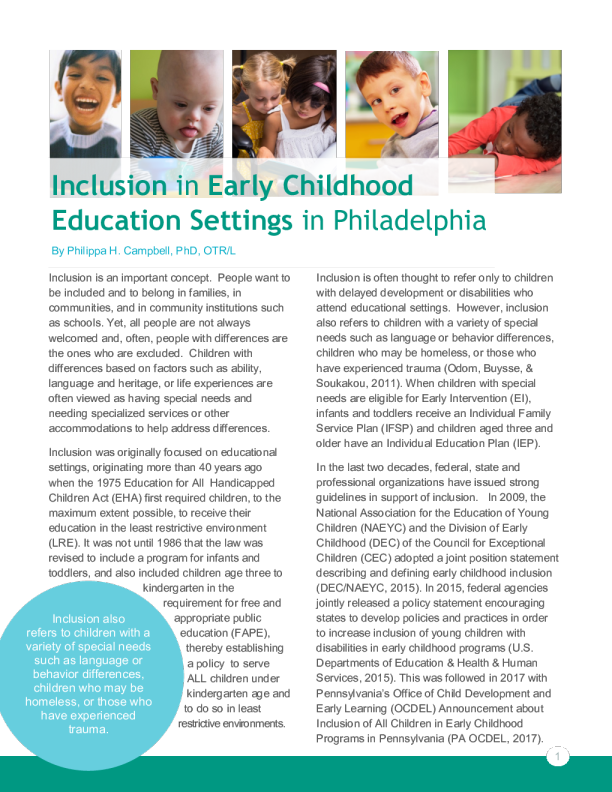Early Childhood Education Teachers 2.0: Strategies to Transform the Profession

The Early Childhood Education Workforce Transformation Initiative (ECEWTI) is a partnership of Delaware Valley Association for the Education of Young Children (DVAEYC), Montgomery Early Learning Centers (MELC), and Public Health Management Corporation (PHMC) to study the early childhood education sector and develop strategies that will result in a larger, more skilled, and more stable workforce. A generous grant from the William Penn Foundation supported ECEWTI. The opinions expressed in this report are those of the authors and do not necessarily reflect the views of the William Penn Foundation.Early Childhood Education Teachers 2.0: Strategies to Transform the ProfessionA Preliminary Report from the Early Childhood Education Workforce Transformation InitiativeMARCH 2016 TABLE OF CONTENTSExecutive SummaryIntroductionTeacher RecruitmentTeacher Recruitment - RecommendationsTeacher Preparation Teacher Preparation - RecommendationsTeacher Retention and AdvancementTeacher Retention and Advancement - RecommendationsConclusionReferences26812151823273133 2 EXECUTIVE SUMMARY While the benefits of quality early childhood education (ECE) are widely known and accepted, the current ECE delivery system is unable to fully realize those benefits for children, families, and society. In spite of recent increases in state funding for Pre-kindergarten and local interest in universal Pre-kindergarten in Philadelphia, there are multiple, complex factors that challenge bringing quality ECE to scale. These include: insufficient public rates of pay to ECE providers; limited public investment in ECE; certified teacher shortages, and; limited teacher effectiveness. Process The ECE Workforce Transformation Initiative (ECEWTI) set out to learn more about the ECE workforce in Philadelphia and to design strategies for realizing a teacher workforce fully qualified and of sufficient size to deliver quality ECE. ECEWTI collected data through online surveys, focus groups, interviews, case studies, secondary data analysis and literature reviews. Data were collected about ECE employers, ECE staff, and ECE teacher preparation programs in order to answer the following questions: • How well do the region’s teacher preparation programs prepare ECE teaching staff for their jobs? • What are the attributes of highly effective teacher preparation programs and what will it take to advance these strategies in the local higher education community? • What factors (in addition to compensation) contribute to job satisfaction among ECE teachers and what strategies could reduce the high turnover rate among ECE teachers? • How can the ECE field be more inclusive of men, Latinos and other populations less frequently occupying ECE teacher positions? • How well do teachers progress along an ECE career pathway that ties increased education and credential attainment to advanced positions and compensation and how might that be improved? • Are there successful models and/or lessons from other cities or sectors that should inform our efforts in Philadelphia? These questions focus on understanding how to build instructional excellence throughout early childhood education classrooms in order to enhance outcomes for young children. Teachers with adequate preparation (BA degree with coursework in child development) and the desire and ability to form attached, nurturing relationships with young children are foundational to quality ECE and uncovering how to prepare, recruit, retain, and grow these professionals was the focus of this initiative. Findings reveal that inadequate ECE teacher compensation is a critical barrier to: teacher recruitment, preparation, retention, advancement, and effectiveness; the quality of programs, 3 and positive child outcomes. It appears to be the single most important factor limiting quality ECE and the positive child outcomes that it delivers. However, as described below, the ECE landscape is complex and many facets of the ECE system are interwoven. Changes to any one will create ripple effects and potentially unintended consequences in other areas. This is particularly true if the overall public investment in ECE remains constant. Background There are less than 15,000 high quality slots for Philadelphia’s 100,000+ children, birth-five in the Keystone STARS system. Quality is economically challenging to achieve and maintain. The base subsidy rate that Pennsylvania offers for child care has not increased since 2007,1 and public funding is insufficient to cover the costs of quality ECE. According to the Nonprofit Finance Fund, child care subsidies “fall far short of covering the full cost of care. This gap increases as quality of care goes up.”2 All current early childhood education funding sources are discretionary programs. Funding is capped, regardless of the number of eligible children and families on waiting lists. In its recent Recommendations Report, The Philadelphia Commission on




